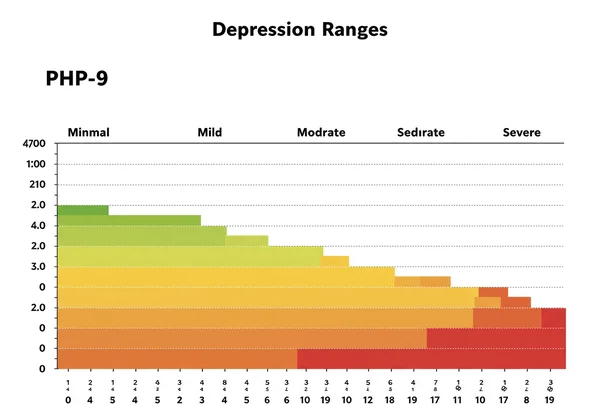The Ultimate Guide to PHQ-9: Patient Health Questionnaire
August 26, 2025 | By Clara Holloway
Taking a moment to check in with your emotional well-being is one of the most powerful steps you can take for your overall health. In a world that moves so fast, it's easy to overlook subtle shifts in our mood, energy, and outlook. But what if you had a simple, trusted tool to help you understand what you're feeling? What is the PHQ-9 and how can it help you? This guide will walk you through everything you need to know about the PHQ-9, your personal emotional checkup. It's a first step toward clarity, and you can start your assessment today.

What is the PHQ-9 and Its Importance?
The Patient Health Questionnaire-9, or PHQ-9, is a straightforward, nine-question instrument designed to screen for the presence and severity of depression symptoms. It is one of the most widely used and respected depression screening tools by doctors, therapists, and researchers globally. Think of it not as a test you pass or fail, but as a mirror reflecting your emotional state over the last two weeks.
Its importance lies in its simplicity and effectiveness. In just a few minutes, it provides a valuable snapshot of your mental health that can help you and your healthcare provider understand if further conversation is needed. The PHQ-9 opens the door to self-awareness and empowers you to seek support when you need it most, making it a vital resource in personal and clinical healthcare.
The Origin and Clinical Validation of the PHQ-9
To trust a tool, it helps to know where it comes from. The PHQ-9 was developed by Drs. Robert L. Spitzer, Janet B.W. Williams, and Kurt Kroenke, leading researchers in mental health. It is derived from the more extensive PRIME-MD diagnostic instrument and was clinically validated in numerous studies, proving its reliability and accuracy as a screening tool. Its strong scientific backing is why it has become a gold standard for an initial phq 9 assessment. This validation ensures the questions you answer are meaningful and the results are a dependable indicator of depressive symptoms.
Who Can Benefit from the PHQ-9 Assessment?
The beauty of the PHQ-9 is its broad applicability. Virtually anyone can benefit from this brief emotional checkup. Specific groups who may find it especially helpful include:
-
The Worried Well: Individuals feeling stressed, persistently sad, or just "not themselves" can use it to gauge the severity of their feelings.
-
Caregivers and Family: If you are concerned about a loved one, understanding the
phq 9 questionnairecan help you gently suggest they explore their feelings. -
Students and Professionals: Those facing academic or work-related pressure can use it to monitor their stress levels and prevent burnout.
-
Patients with Chronic Illness: People managing long-term health conditions often experience co-occurring depression, and the PHQ-9 is an excellent tool for regular monitoring.

A Question-by-Question Look at the PHQ-9
The PHQ-9 asks about the nine most common symptoms of depression, as outlined in the DSM-5, the standard classification of mental disorders). Each question prompts you to reflect on how often you have been bothered by a specific issue over the past two weeks. The responses range from "Not at all" to "Nearly every day."
The questions cover key areas such as loss of interest or pleasure (anhedonia), feelings of sadness or hopelessness, sleep disturbances, fatigue, changes in appetite, feelings of worthlessness, concentration difficulties, and changes in movement. This comprehensive approach ensures a well-rounded initial screening.
Understanding Each Item's Role in Assessment
Each of the nine questions is carefully chosen to correspond to a specific criterion for Major Depressive Disorder. For instance, Question 1 ("Little interest or pleasure in doing things") directly assesses anhedonia, a core symptom of depression. Questions about sleep, appetite, and energy levels explore the physical manifestations of emotional distress.
By looking at these varied symptoms together, the PHQ-9 provides a holistic view. It helps differentiate between simply having a bad week and experiencing persistent symptoms that may require attention. Completing the assessment on our platform will give you clear phq9 results to better understand these patterns.
The Significance of PHQ-9 Question 9
Question 9 is the most sensitive and critical item on the questionnaire. It asks about "Thoughts that you would be better off dead or of hurting yourself in some way." It is vital to approach this question with honesty and seriousness. Any thoughts of self-harm, no matter how fleeting, are a sign that you should seek immediate help.
If you are having these thoughts, please know you are not alone and help is available. Contact a crisis hotline like the National Suicide Prevention Lifeline at 988 or seek immediate professional help. Your safety is the top priority. This question is included because it is a crucial indicator of risk, and acknowledging these feelings is the first step toward safety and support.

How to Score and Interpret Your PHQ-9 Results
Understanding your phq 9 score interpretation is simple and insightful. The process of scoring helps translate your feelings into a clearer picture of your emotional health, providing a starting point for what to do next.
Calculating Your Total PHQ-9 Score Accurately
The scoring for the PHQ-9 is straightforward. Each of the nine questions has four possible answers, which are assigned points as follows:
- Not at all = 0 points
- Several days = 1 point
- More than half the days = 2 points
- Nearly every day = 3 points
Your total score is the sum of the points from all nine questions, resulting in a number between 0 and 27. When you take the free online test, this calculation is done for you instantly, giving you immediate insight.
Decoding Your PHQ-9 Score: What Each Range Means
The total score corresponds to a specific level of depressive symptom severity. This phq 9 score meaning helps contextualize your results and guide your next steps. The standard phq 9 score ranges are:
-
0-4: Minimal or No Depression. Your symptoms are likely not significant, but it's always good to practice self-care.
-
5-9: Mild Depression. You may be experiencing mild symptoms. Monitoring your feelings and focusing on healthy lifestyle habits is a good idea.
-
10-14: Moderate Depression. Symptoms are clearly present and may be affecting your daily life. It is recommended to discuss these results with a doctor or mental health professional.
-
15-19: Moderately Severe Depression. Your symptoms are likely causing significant distress and functional impairment. Professional consultation is strongly advised.
-
20-27: Severe Depression. These symptoms are seriously impacting your life. It is crucial to seek professional help as soon as possible.

PHQ-9 Limitations and Responsible Use
While the PHQ-9 is an incredibly useful tool, it is essential to understand its limitations and use it responsibly. Awareness of what it can and cannot do is key to leveraging it effectively on your mental health journey.
PHQ-9 as a Screening Tool, Not a Diagnostic Instrument
This is the most critical point to remember: the phq9 depression test is a screener, not a diagnostic tool. A high score suggests that you may have depression and should consult with a professional, but it does not mean you have a clinical diagnosis. A formal diagnosis can only be made by a qualified healthcare professional after a comprehensive evaluation that considers your history, context, and other factors.
When Your PHQ-9 Score Prompts Professional Consultation
Your PHQ-9 score is a catalyst for conversation. If your score is 10 or higher, it is a strong signal to schedule an appointment with a doctor or a mental health provider. Even if your score is in the mild range (5-9), seeking support can be beneficial if the symptoms are persistent or causing you distress. Use your results as a concrete starting point to discuss how you've been feeling. You can begin your checkup and bring the results to your next appointment.
Taking the Next Step: Your Journey to Emotional Health
Understanding your emotional health is the first step toward nurturing it. The Patient Health Questionnaire-9 is a simple, confidential, and clinically validated tool that empowers you to do just that. It provides a clear, objective snapshot of your symptoms, helping you move from a vague sense of unease to a clear understanding of your well-being. It turns vague unease into a clearer understanding of your well-being, paving the way for action.
On this platform, we provide a free and confidential emotional checkup. Beyond the standard score, we offer an optional AI-powered report that delivers personalized insights into your strengths, challenges, and actionable next steps. Your results offer more than just a number; they provide a personal starting point for nurturing your well-being. Take your free PHQ-9 test today and take the first step.
Common Questions About the Patient Health Questionnaire-9 (PHQ-9)
Is the PHQ-9 a reliable diagnostic tool for depression?
No, the PHQ-9 is a highly reliable screening tool, but it is not used to diagnose depression. A diagnosis requires a thorough clinical evaluation by a healthcare professional who will consider your PHQ-9 score alongside other important information about your life and health.
How often should I consider taking the PHQ-9 assessment?
You can take the PHQ-9 whenever you feel the need for an emotional check-in. It's also commonly used by clinicians to monitor symptoms and treatment progress over time. If you're undergoing treatment, your provider may suggest taking it at regular intervals.
What age group is the PHQ-9 typically used for?
The PHQ-9 is validated for use in adults. A modified version, the PHQ-9A, is often used for adolescents (phq9 for adolescents). While the standard version can be informative for older teens, a clinician should always be involved in interpreting the results for younger individuals.
Who is authorized to administer or interpret the PHQ-9?
Anyone can self-administer the PHQ-9, which is one of its greatest strengths. However, the clinical interpretation of the score—especially for making treatment decisions—should be done by a licensed healthcare professional, such as a doctor, psychiatrist, or therapist. You can always get your score on our site to share with a provider.
What are the primary limitations of using the PHQ-9?
The main limitations are that it is a screening tool, not a diagnostic one, and it reflects your feelings over a brief two-week period. It does not capture the complexities or context of your life circumstances. Therefore, it should always be used as a starting point for a conversation, not as a final conclusion.